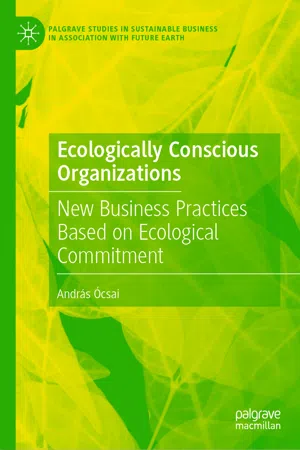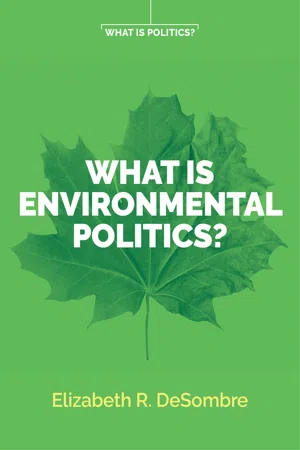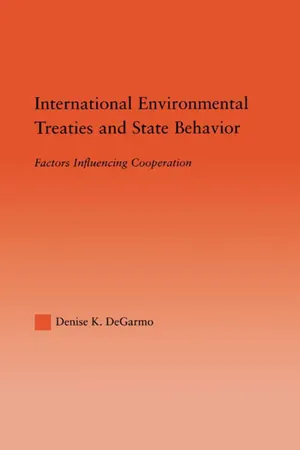Politics & International Relations
Environmental Consciousness
Environmental consciousness refers to the awareness and concern for the impact of human activities on the environment. It encompasses a sense of responsibility towards preserving and protecting natural resources, reducing pollution, and addressing climate change. Environmental consciousness often influences political and international relations decisions, policies, and agreements related to environmental protection and sustainability.
Written by Perlego with AI-assistance
Related key terms
6 Key excerpts on "Environmental Consciousness"
- eBook - ePub
Ecologically Conscious Organizations
New Business Practices Based on Ecological Commitment
- András Ócsai(Author)
- 2020(Publication Date)
- Palgrave Macmillan(Publisher)
1999 ).In the formulation of Christopher (1999 ), ecological consciousness is concern for environmental problems fueled by the knowledge and experience of the degradation of nature . Ecological consciousness also implies that modern thinking is based on false ontological and epistemological presuppositions that prevent modern people from correctly perceiving and responding to environmental problems.According to ecologist thinkers, conventional Environmental Consciousness degrades environmental problems into technical problems; it is therefore unable to help with understanding their root causes. Environmental problems can only be solved if concern for the devastation of nature is accompanied by an “ecological” understanding of the relationship between nature, society, and the individual (Christopher 1999 : p. 358). At the center of ecological consciousness is the belief that environmental problems are the inevitable consequence of an instrumental rationality embodied in the social and cultural institutions of modernity (modern capitalism, industrial technology, individualism, and mechanistic science); thus without new social and cultural institutions based on a new rationality, global disaster is unavoidable (Christopher 1999 : p. 361).Beyond feeling the increasing ecological threat and experiencing related anxiety, ecological consciousness also implies that by formulating a new metaphysical framework of rationality and a new understanding of the nature of the self and its place in the universe we can give meaning to the threat. The steps of this process are the following. (1) Replacing the atomistic concept of the self with a holistic approach (understanding that nature and the individual exist together in ecosystems). (2) Developing an ethical system that allows escape from anthropocentrism in line with the new ontological framework. (3) Recognizing that the realization of an extended self-understanding is possible through a pre-rational process involving changes in individuals’ feelings and relationships to the world. (4) Searching for an ecological rationality : combining the previous steps, thereby creating a viable way to re-rationalize the sociocultural relations that support the actualization and empowerment of ecological consciousness (Christopher 1999 - eBook - ePub
Breaking Out of the Green House
Indian Leadership in Times of Environmental Change
- Dhanasree Jayaram(Author)
- 2012(Publication Date)
- KW Publishers(Publisher)
8 Ecological citizenship goes one step ahead to recognise non-human beings as ‘fellow citizens’. Since they cannot be incorporated in the political decision-making process for practical reasons, ecological citizenship requires human beings to take the responsibility of protecting them. Environment is one of the factors that unite the entire world and its population and therefore, the concept of global environmental citizenship invites plenty of attention. Marshall McLuhan’s concept of ‘global village’ talks about integration and evolution of global values that could make the world a better place to live in with much more complex interdependence along with risk-sharing partnerships. The term citizenship connotes the existence of the State. Global citizenship debunks national identities and national boundaries. However, it has been seen that very few actors – State or non-State – have shown the willingness to defy national sovereignty in favour of environmental issues.Ecological citizenship has three tenets—ecological awareness, ecological citizenship as a legal concept, and ecological citizenship as a political concept. Ecological awareness implies that a citizen must ‘understand the importance of making collective decisions regarding the commons, seek the common good, identify with bioregions and ecosystems rather than obsolete nation-states or transnational corporations, consider the wider impact of his/her actions, be committed to community building, observe the flow of power and act according to his/her convictions’. The other two aspects are described in detail as rights in Principle 13 of the Earth Charter (an international declaration of fundamental values and principles considered useful by its supporters for building a just, sustainable, and peaceful global society in the 21st century). These rights aim at ‘strengthening of democratic institutions at all levels’, and providing transparency and accountability in governance, inclusive participation in decision-making, and access to justice’.9 - eBook - ePub
- Elizabeth R. DeSombre(Author)
- 2020(Publication Date)
- Polity(Publisher)
Although environmental protection becomes more likely as societies become wealthier, that process is not automatic. It requires a set of social decisions and political action. Access to clean water and sanitation necessitates a level of infrastructure that can be provided on a large scale only by governmental action. A decrease in air pollution comes not from the altruism of industry but from rules that require reductions in emissions, along with incentives that can assist with the development or adoption of new technologies. Poachers rarely decide on their own to stop harvesting threatened species; instead, rules, monitoring, and enforcement increase the cost of continuing their species-threatening behavior. Even when businesses or industries decide on their own to make environmental improvements, the spectre of potential regulation if their behavior doesn’t change often contributes to those decisions. The role of politics is even clearer at the international level, since treaties are negotiated and then implemented by governments. Most environmental improvement comes, at least in part, from environmental politics. Politics as the Reflection of Society Environmental politics is indeed a contentious process. But if we return to the definitions in chapter 1, we’ll remind ourselves that politics is the process of societies making decisions about policy; it is about how to allocate resources of all types across society. People studying environmental politics may begin with the belief that it is important to protect natural resources and prevent pollution, whether for the wellbeing of people or of species or ecosystems more broadly. But these are not the only values, even for those who hold them. The politics of the environment involves legitimate tradeoffs between (some kinds of) jobs and environmental protection, between convenience and health, and between short-term and long-term benefits, among many others - eBook - ePub
Rio
Unravelling the Consequences
- Caroline Thomas(Author)
- 2014(Publication Date)
- Routledge(Publisher)
The environment seems to have been co-opted by politicians of all parties, so that each of them claims to act in a way that protects it, and all policies can be justified as environmentally conscious. The result is a kind of stasis whereby the environment is dragged in to justify each party’s policies, with the real work in environmental policy going on behind the public gaze. If all parties are ‘environmentally-conscious’ then how can we choose between them? In the same way that no leader would say that he or she was proposing a policy that was against the national interest, so no politician will propose a policy that is against the environment; the term becomes virtually meaningless in political debate. Far more serious, and controversial, is my fifth point, which, simply stated, is that environmental concerns are salient neither for governments nor for publics. This would doubtless enrage many activists who, whilst accepting that governments were decidedly slippery when it came to doing anything about the environment, would none the less claim that environmental concerns were important to increasing sections of the population. There is a real need to distinguish between statements supporting environmental issues and a willingness to suffer any loss of standard of living in order to do anything towards implementing those concerns. Opinion polls may well report that large percentages of the populations in developed countries are concerned about greenhouse gases or about acid rain, but these findings have to be treated with considerable care. After all, what might it say about you if you were not concerned about these issues? There is a high probability of bandwaggoning and fadism. Everyone feels that they should be worried about the environment and live a greener life, but how far will they go to translate that feeling into action? More problematically, there is the worry that environmentalism is particularly related to social class - eBook - ePub
Environmental Consciousness in China
Change with Social Transformation
- Qiu Zhong, Guoqing Shi(Authors)
- 2020(Publication Date)
- Chandos Publishing(Publisher)
To improve public scientific literacy is the necessary requirement of modern societies’ civilization. This opinion became the consensus of both the scientific and political arenas. In our daily life, the success of a series of social development issues mostly related to the environment—such as global warming, human cloning, AIDS prevention, and the investment in technology research and so on—are mainly based on the consciousness and participation of people. Therefore, research concerning the establishment of Environmental Consciousness has helped us in dealing with environmental problems.Hannigan pointed out that “Environmental problems do not materialize by themselves; rather, they must be ‘constructed’ by individuals or organizations who define pollution or some other objective condition as worrisome and seek to do something about it” (Hannigan, 1995 ). This view is related to the mass media “agenda-setting” theory. A well-known dictum by political scientist Bernard Cohen was that “The press may not be successful much of the time in telling people what to think, but it is stunningly successful in telling its readers what to think about” (Cohen, 1963 ). In the United States, important issues are put on the agenda by mass media; the typical example is environmental protection in the 1970s. Agenda-setting theory shared the same idea with Anthony Downs’s “issue-attention cycle”—the rise and fall of an issue on the public agenda (Downs, 1972 ). However, Riley E. Dunlap points out that “Downs’ issue-attention cycle is not an inexorable process” (Dunlap, 1995 ). Public support for environmental protection has gone through its infancy, arousal, climax, and decline, but is still in sight. Even after the government withdrew its attention from the environment, mass Environmental Consciousness made the 1980s revive after the recession.The government indeed received pressure from the environmental movement. On one hand, the environmental movements made the government execute a more real practice while on the other hand, the Green Party grew and gained the opportunity to exercise influence over the government. In order to gain the public’s trust and votes, the US’s political parties call themselves as environmental protectors. - Denise DeGarmo(Author)
- 2013(Publication Date)
- Routledge(Publisher)
83 is one way in which international relations and the international environment may be more easily studied.According to this view, international politics is understood as a “socially constructed institution that varies across space and time, with multiple meanings and practices that are not set in stone.”84 Environmental problems are believed to be influenced by not only the technological instruments through which information is produced and disseminated, but also by the institutional venue in which problems and solutions are debated and decided.85 In other words, different people and groups construct their understanding of the global environment and the implications of environmental changes and processes in different ways. This in turn leads to different assumptions and perceptions of environmental needs and different understandings of global ecological interdependence.86 These competing processes of construction are mediated by a host of social, political and economic institutions.Three models for the resolution of international environmental problems emerge from the social construction framework. The first model, known as global managerialism, proposes that international environmental solutions not only require strong central protection of environments around the world, but the division of labor between governments and international organizations, with NGOs performing an advisory role on the side. International environmental protection, then, would be best achieved through world conservation and global environmental services. The second model, known as redistributive development, pays greater attention toward equity issues. According to this model, past global inequities and the future of environmentally sound development in the developing world requires the “North” to increase financial and technological assistance to the “South.” Finally, the international sustainability model promotes the adoption of global sustainable development practices in the environmental, economic, and social realms to ensure the preservation of the international environment and the continuation of environmentally sound development into the future.87
Index pages curate the most relevant extracts from our library of academic textbooks. They’ve been created using an in-house natural language model (NLM), each adding context and meaning to key research topics.





